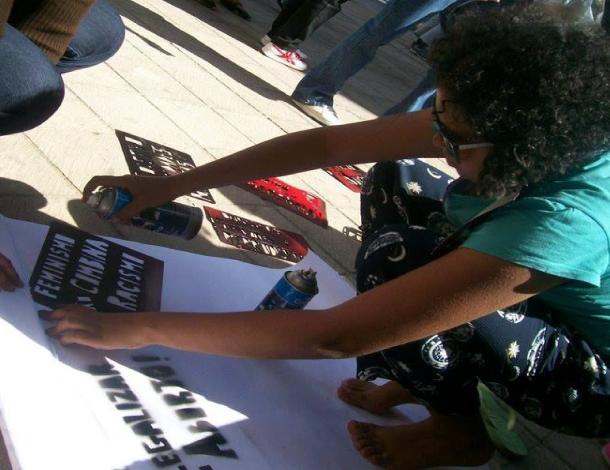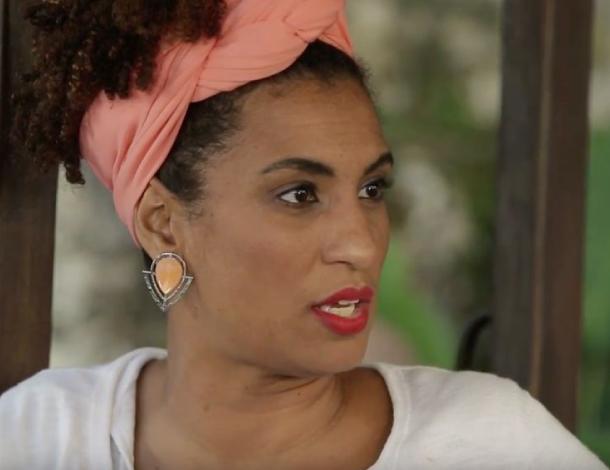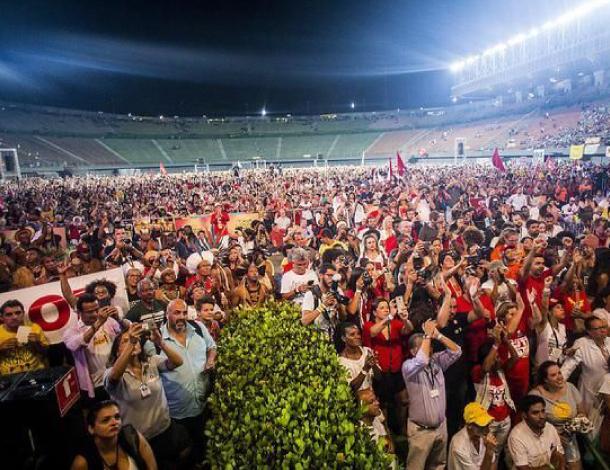A young feminist activist from Brazil describes the cycle of collective pain, mourning, and hope that she and her comrades experienced throughout recent political events
Youthful Hope and Feminist Activism
There was a time when we, feminist activists in Brazil, truly believed that our work, ideas, and actions were enough. We assumed that we could change the realities of all women and girls. Sometime between the years 2004 and 2006, I cultivated a tireless routine as a young feminist of packing my things and travelling to Brasília, Brazil’s capital. We felt at home in Brasilia, where all the government organs were established.

There, we would interact with the government, particularly the Workers Party, which we believed to be our partner. This same government invited us to sit at the same table to dialogue as equals. They seemed, at the time, to listen to our demands and keep us updated on the ease or complications of executing our projects and concerns. Despite the fact that racism and other problems that we raise now already existed before, there was a collective agenda. I would return home every time with a slight sense of mission accomplished. Several years later, unexpectedly, I watched from afar as my companions and close friends were hit by rubber bullets, tear gas, and a vast and real sense of impotence.
The New Brazil
First, they took Dilma Rousseff. She was one of the only democratically elected women presidents in the world, and they ousted her from the country's administration through a coup d’etat that placed Michel Temer, the vice-president of a conservative political party, in power. With that maneuver, they also undid a feminist victory.
Temer, in his first days in office, showed that the new Brazil was made up of white men, and that the table that we used to sit at for a coffee and chat would from that point on be occupied by fascists and the military. At that moment, things already started to look different, strange and very uncomfortable, but we tried to carry on, in the belief that we would reverse this story.
And then suddenly, every Black and poor person, woman, LGBT, and social movement activist was hit by the four bullets that struck councilwoman Marielle Franco on Joaquim Palhares Street in central Rio de Janeiro. Our hope was shed alongside Marielle Franco’s blood in the dark streets of Rio. We understood that the power and weapons they carry were stronger and faster than our voices, ideologies, and our will for a fair and egalitarian Brazil. These shots were felt viscerally by the thousands of people who participated in the World Social Forum (WSF) that took place in Salvador, Brazil this year.

While we were in sessions, discussing and planning concrete actions to effect change in the world, those four shots hit us without warning, depriving us of the chance to defend ourselves.
With these news, the mood at the WSF turned from hope and ambition to one of mourning, pain, and impotence. Even so, we tried to gather the mental and emotional resources we had (and even those we did not have) to persist, multiply and become Marielles, Claudias, Luanas, Amarildos, and many others who were harmed while fighting to survive racism, patriarchy, state violence, and economic exploitation.
With shaken voices and varied accents, they said, “we are not alone!”
I remembered that day, March 14th, as one of the most intense and sad of the year. The coffee I had that morning was more bitter than usual. I cried when I heard Dilma speaking at one of the plenary sessions of the World Social Forum (WSF). She seemed so close to me that I could feel the conviction in her voice. I cried when I remembered the scorching sun where I listened with a shy smile on my face as my Black sisters from Brazil and other Latin American countries expressed their emotions, with shaky voices and varied accents. They said that we are not alone and demonstrated that my life, emotions, and struggles were the same as theirs and many others like us.
As we struggled to mourn and heal from the bullet wounds, a few days later, we watched on television as Lula da Silva, a former president who had changed Brazil’s history, was arrested arbitrarily and without sufficient evidence.
Since then, I have tried to believe that this string of events is just a nightmare; that yes, another world is possible; that the president did not suffer a coup d'état; that a Black lesbian feminist councillor was not brutally murdered; that President Lula was not politically imprisoned; that the right to abortion is getting closer; that violence against women will decrease; that the military will vacate the favelas of Rio de Janeiro and stop murdering Black and poor people. But as Simone de Beauvoir said, “It is horrible to watch the agony of hope.”

Still, I carry in me that tireless desire from the young feminist I was in the 2000s who packed her things and embarked on monthly journeys to the elaborate dialogues in Brasilia. I will continue to believe in the new generation that already understands that we cannot live only from public policies. I also believe in my companheirxs from diverse social movements. As we continue resisting in the streets and our communities, we will keep growing stronger.
I especially believe in the struggle of my Black sisters who remain committed to visioning and manifesting the future. Hopefully, one day, we will return to the streets, immune to shots, and this time, to celebrate a hard-won victory.
This essay is also available in audio format:
2224x1253.jpg)